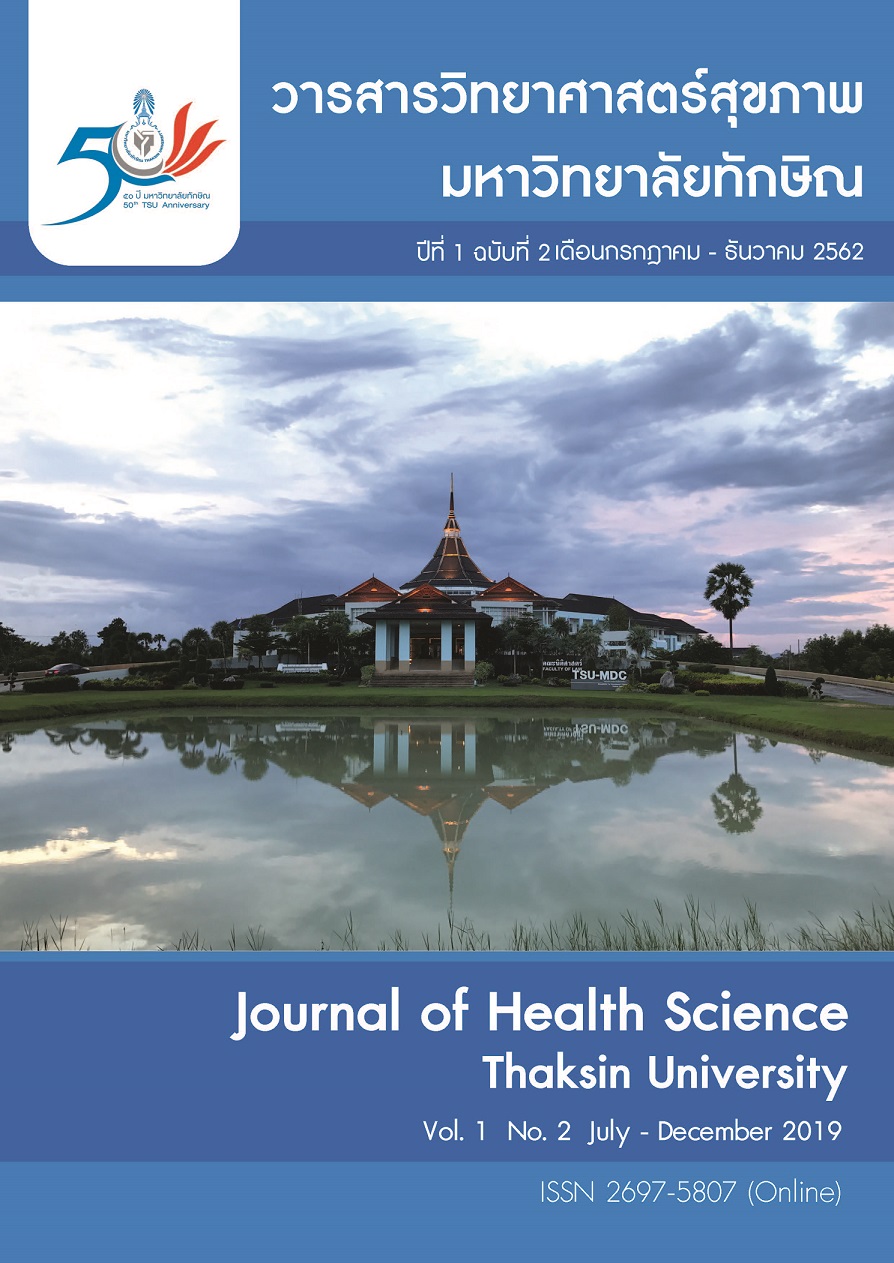Rationale Drug Use Policy: Success or Failure?
Main Article Content
Abstract
The objective of this descriptive study was to evaluate the outcomes of rationale drug use (RDU) policy in by using CIPP Model in 3 topics including results, key of success, and opportunity development. The respondents who had responsibilities with RDU in the regional health 11 were invited to interview. The achievement of RDU followed by the Ministry of Public Health’s criteria was collected from the reports of all hospitals, and cost of medicines between 2017 - 2018 was summarized from the report of Administrative Division of Public Health. Descriptive statistics were performed to analyze data. In 2017, hospitals located in the regional health 11 passed RDU step I 88.75%. In 2018 they met RDU step I and step II 100% and 23.46% respectively. In addition, the management of anitimicrobial resistance in hospitals had been provided.These results showed that RDU policy was successful. The key success factors were consisted the administrators, direction and monitoring, effectiveness in resources management, and co-operation in multidisciplinary team. The RDU policy lead to the several positive benefits including the rationale medicines use in several hospitals, efficiency
Article Details
References
2. Grosse SD. Assessing cost-effectiveness in healthcare:history of the $50,000 per QALY threshold. Expert review of pharmacoecono-mics & outcomes research 2008; 8(2): 165-78.
3. Johannesson, M., Meltzer, D. Some reflections on cost-effectiveness analysis. Health economics 1998; 7(1): 1-7.
4. Mekton, S. Development of rational drug use policy: [Internet] 2019 [Cited 14 May, 2019]. Available from
https://dmsic.moph.go.th/dmsic/admin/files/userfiles/files/00_RDU_Policy_Sophon.pdf.
5. Thavorncharoensap, M., Teerawattananon, Y., Natanant, S., Kulpeng, W., Yothasamut, J., Werayingyong, P.
Estimating the willingness to pay for a quality-adjusted life year in Thailand: does the context of health gain
matter? ClinicoEconomics and outcomes research 2013; 5: 29-36.
6. Sirirussamee, B. Antibiotics use behavior of people in Nakhon Pathom Province. Nakhon Pathom: Mahidol University, Institute for Population and Social Research 1997;
7. Pisonthi, C. RDU Hospital: The Pathway to Rational Drug Use. Thai J Pharmacol 2015; 37: (1): 48-61. (In Thai).
8. Chongtrakul, P. RDU hospital: the pathway to rational drug use. Thai Journal of Pharmacology 2015; 37: 48-62.
9. Stufflebeam, D.L. The CIPP Model for Evaluation. In: Kellaghan, T., Stufflebeam, D.L. (eds) International Handbook of Educational Evaluation. Kluwer International Handbooks of Education, 9. Springer, Dordrecht; 2003.
10. Driscoll, D.L., Appiah-Yeboah, A., Salib, P., and Rupert, D.J., Merging Qualitative and Quantitative Data in
Mixed Methods Research: How To and Why Not 2007; 3(7): 19-28.
11. Coloma, P. M. Combining electronic health-care databases in Europe to allow for large-scale drug safety monitoring: the EUADR Project. Pharmacoepidemiol. Drug Saf 2011; 20: 1–11.
12. National Antimicrobial Resistance Surveillance Center. Antimicrobial resistance 2000-2017 [Internet] 2019
[Cited 2 September 2019]. Available, from: https://narst. dmsc.moph.go.th.
13. Vattanavanit, V., Chayakul, P. Acinetobacter infections in the intensive care unit. Songklanagarind Medical
Journal 2013; 31(2): 91-100. (in Thai).
14. Sumpradit, N., Chongtrakul, P., Anuwong, K., Pumtong, S., Kongsomboon, K. Antibiotics Smart Use: a workable model for promoting the rational use of medicines in Thailand. Bull World Health Organ 2012; 90(12): 905-13.
15. Avorn, J., Soumerai, S.B. Improving drugtherapy decisions through educational outreach. A randomized controlled trial of academically based “detailing”. N Engl J Med 1983; 308(24): 1457–1463.
16. Tomokawa, S., Kaewviset, S., Saito, J., Akiyama, T, Waikugu,l J. Key factors for school health policy implementation in Thailand. Health Educ Res 2018; 33(2): 186-195.
17. Suphanchaimat, R., Kantamaturapoj, K., Pudpong, N., Putthasri, W., Mills, A. Health insurance for people with citizenship problems in Thailand: a case study of policy implementation. Health Policy Plan 2016; 31(2): 229-38.
18. Csete, J., Kamarulzaman, A., Kazatchkine, M., Altice, F., Balicki. M., Public health and international drug policy. Lancet 2016; 387(10026): 1427-1480.


